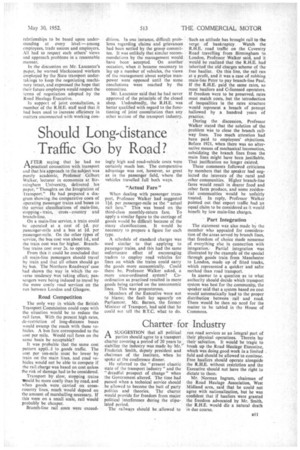Should Long-distance Traffic Go by Road?
Page 45

If you've noticed an error in this article please click here to report it so we can fix it.
AFIER saying that he had no practical connection with.transport and that his approach to the subject was purely academic, Professor Gilbert Walker, lecturer in economics at Birmingham University, delivered his paper, "Thoughts on the Integration of Transport." He had prepared a diagram showing the comparative costs of operating passenger trains and buses in the service classifications of main-line, stopping train, cross country and branch-line.
On a main-line service, a train could be operated at a cost of. id. per passenger-mile and a bus at id. per passenger-mile. On the other types of service, the bus cost was about Id., and the train cost was far higher. Branchline trains cost over 2s. to operate.
From this it could be concluded that all main-line passengers should travel by train and that all others should go by bus. The Northern Roadways' case had shown the way in which the reverse tendency was taking effect; passengers were being induced to travel by the more costly road services on the run between London and Glasgow.
Road Competition
The only way in which the British Transport Commission could cope with the situation would be to reduce the rail fares. With the present high rates, de-restriction of long-distance buses would swamp the roads with these vehicles. A bus fare corresponded to the cost per mile. Would rail fares on the same basis be acceptable?
It was probable that the same cost pattern appli. d to goods traffic. The cost per ton-mile must be lower by train on the main lines, and road vehicles would not be able to compete if the rail charge was based on cost unless the risk of damage had to be considered.
Transport by slow, stopping trains would be more costly than by road, and when goods were carried on crosscountry lines, much would depend on the amount of marshalling necessary. If this were on a small scale, rail would probably be cheaper.
Branch-line rail costs were exceed
ingly high and road-vehicle costs were certainly much less. The comparative advantage was not, however, so great as in the passenger field, where the vehicles travelled full both ways.
"Actual Fare" When dealing with passenger transport, Professor Walker had suggested lid. per passenger-mile as the "actual rail fare." This was based on the third-class monthly-return fare. To apply a similar figure to the carriage of goods would be difficult because a the many classifications. It would be necessary to prepare a figure for each type.
A schedule of standard charges was used similar to that applying to passenger trains, and this had the same unfortunate effect of encouraging traders to employ road vehicles for lines on which the trains could carry the goods more economically. Could there he, Professor Walker asked, a more unco-ordinated system? Coordination as practised resulted in more goods being carried on the uneconomic lines. This was preposterous.
Members of the Executive were not td blame; the fault lay squarely on Parliament. Mr. Barnes, the former Minister of Transport, had said that he could not tell the B.T.C. what to do.
Such an attitude has brought rail to the verge of bankruptcy. Watch the R.H.E. road traffic on the Coventry Road travelling from Birmingham to London, Professor Walker said, and it would be realized that the R.H.E. had inherited the old charges scheme of the free haulier. On this line, the rail ran at a profit, and it was a case of robbing main-line Peter to pay branch-line Paul. If the R.H.E. paid the same rates, so must hauliers and C-licensed operators. If freedom were to be preserved, rates must match costs, but the introduction of inequalities in the rates structure would represent a breach of precept hallowed by a hundred years of practice.
During the discussion, Professor Walker stated that the solution of the problem was to close the branch railway lines. Too much attention had been paid to employees' objections. Before 1921, when there was no alternative means of mechanical locomotion. subsidizing the branch lines from the main lines might have been justifiable. That justification no longer existed.
These comments followed criticisms by members that the speaker had neglected the interests of the rural and other communities. Higher branch-line fares would result in dearer food and other farm produce, and some residential communities would he unfairly treated. In reply, Professor Walker pointed out that export traffic had an equal claim to be considered as it would benefit by low main-line charges.
Part Integration
The statement was also made by the member who appealed for consideration of the areas served by branch lines. that freedom of choice made nonsense of everything else in connection with integration.Partial integration was illustrated by the example of the special through goods train from Manchester to London, made up of fitted trucks, which represented a quicker 'arid safer method than road transport.
In answer to a question as to what authority should decide which transport system was best for the community, the speaker said that a system based on cost would automatically lead to the proper distribution between rail and road. There would be then no need for the matter to be tabled in the House of Commons.




























































































